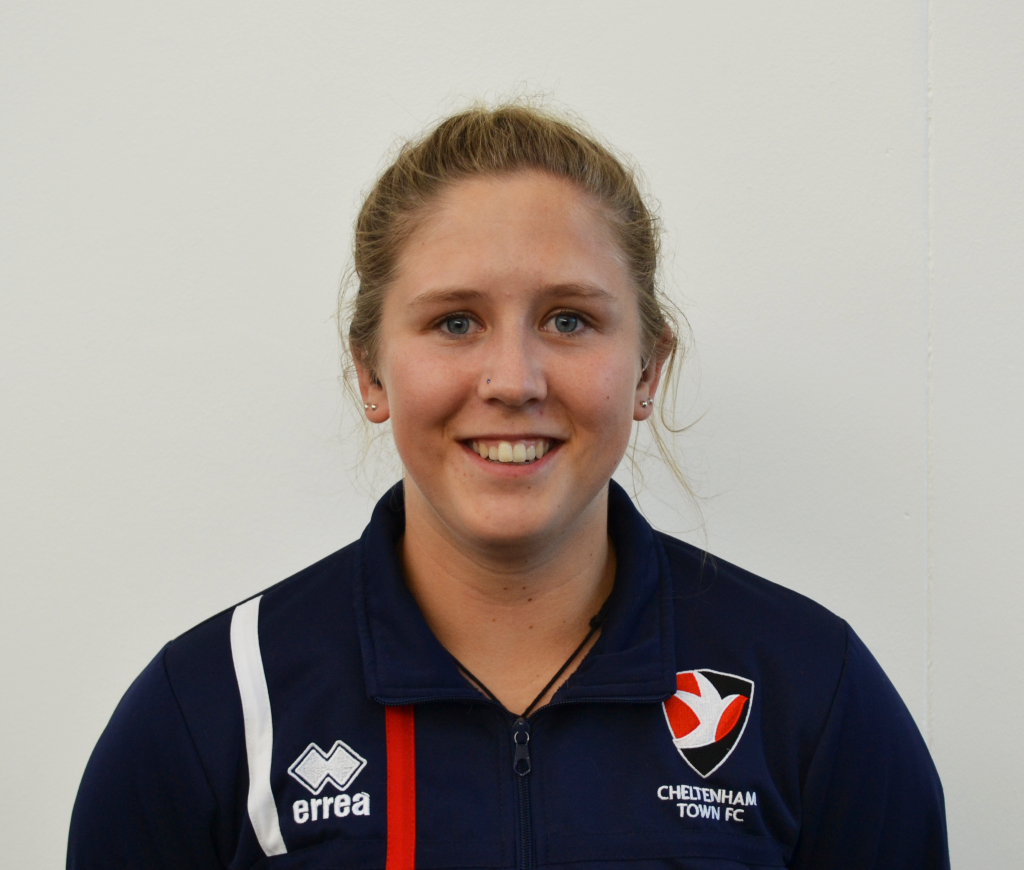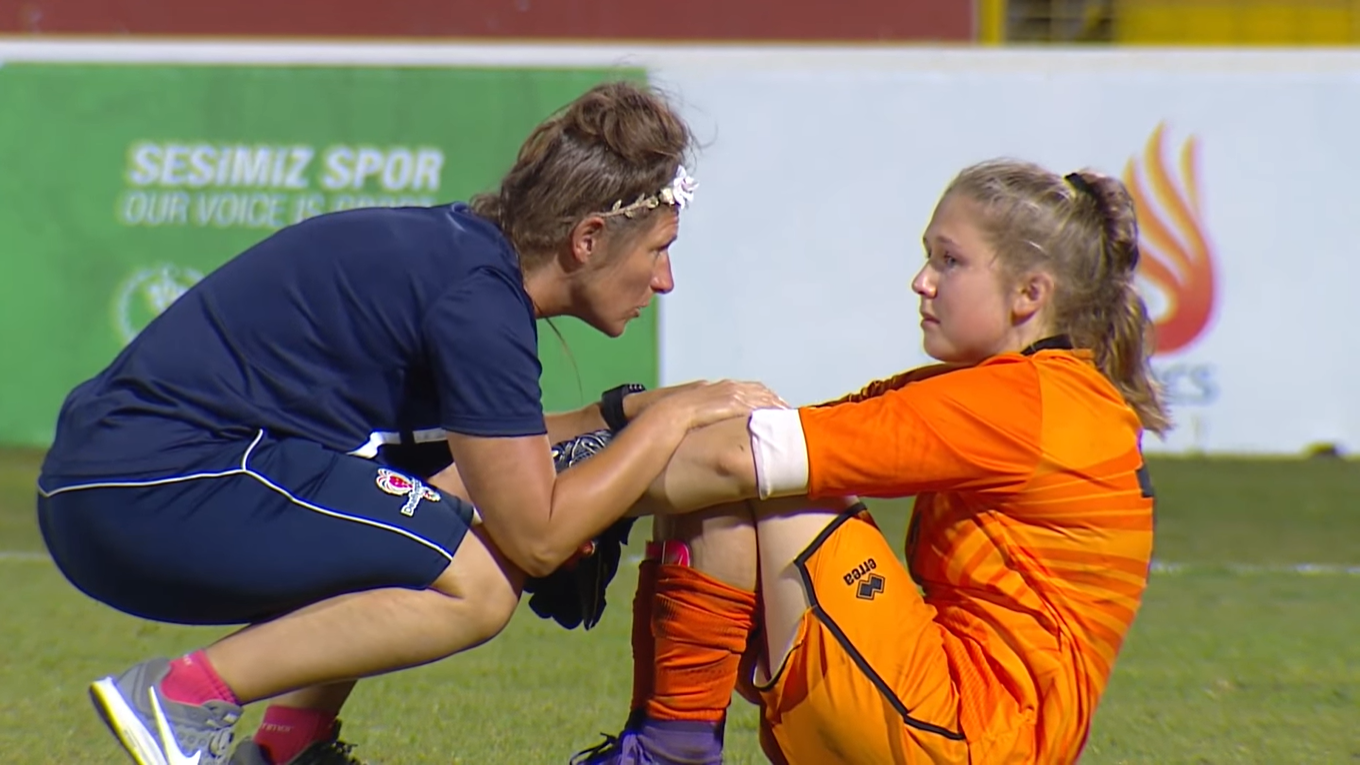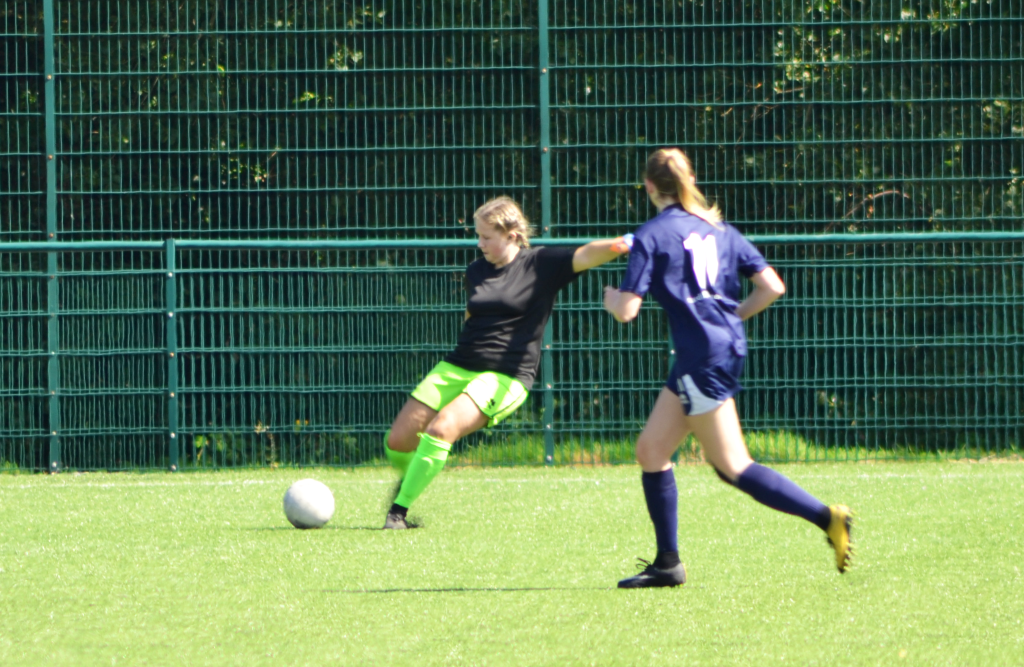9th May 2020

By Bruna Reis
“I don’t think there’s any place for inequality within the game, not just for deaf players.”
– Cheltenham Town Ladies and DeaflympicsGB’s goalkeeper, Molly Ripley
Having been with Cheltenham Town Ladies since the start of the 2019/20 campaign, Molly Ripley opens up about her footballing career as a deaf player.
Coming from a sporting background, Ripley was always encouraged to take part in physical play and soon realised from a young age that, ‘football was my number one choice.’
She started playing at the age of six, following her older brother’s steps in joining a local club and was the only girl in an all-boys team, Cholsey Bluebirds FC.
“Being the only girl in an all-boys team felt very intimidating but I was welcomed into the team and I really enjoyed it.
“This is where it all started,” she recalled.
Born with hearing loss, she represents both DeaflympicsGB in football and England in both deaf futsal and football and recollected fond memories on the many great feats she ‘will never forget.’
“My first international football debut against Poland at the 23rd Deaflympics in 2017. I was in the starting eleven and I was incredibly nervous.
“I remember walking out of the tunnel on to the pitch thinking it was all a dream, it was intense. When the national anthem started playing and I saw the interpreter signing along I felt really emotional. It was my first time away from home without my parents.”
Albeit suffering a 2-0 loss against Poland, a sense of relief was felt, ‘to get the first game done’ in the red and blue outfit.
The 23rd Deaflympics was held in Turkey (Samsun) in the summer of 2017, where Great Britain came in fourth place, a tournament Ripley considered to be ‘very dramatic and eventful’ as emotions were going through the roof.
“I was randomly selected for a hearing test. There are strict regulations for eligibility and if you fail you are sent straight home.
“Due to all the travelling, we hadn’t slept for at least 20 hours and hadn’t eaten for a very long time.”
DeaflympcsGB made it to the semi-final and received an enormous support from all other GB athletes as they contested for the bronze medal against Brazil. Unfortunately though, luck wasn’t on their side with the Brazilians snatching a 2-1 win, a match marked by a ‘controversial penalty.’
“That’s just the way it goes sometimes.”
The English goalkeeper described the game as being one of the most memorable moments on the pitch when their opponents were given a penalty.
“This was due to a foul I made on one of their players but to this day I still maintain that I touched the ball and it should never have been a penalty,” she convincingly stated.
“I got a yellow card, which was a first for me.”
Nonetheless, a remarkable experience for the youngster who was surrounded by different cultures and athletes from over the world, those that would eventually ‘become familiar faces at future competitions.’
The number one Deaf Great Britain’s goalkeeper still finds the whole experience indescribable.
“It’s all a bit surreal to say that I have played for my country. I’m really honoured and would like to be their goalkeeper for as long as I can.”

But with hard work comes the reward and Ripley was later invited to join the East Regional Talent Centre in Bedford leading to the beginning of her futsal journey.
“This required a 3-hour round trip every Saturday morning.
“From here I was invited to the National Emerging Talent program which led onto me being invited to my first England Deaf Women’s’ Futsal training camp. This gave me the opportunity to train at St George’s Park (FA national training centre), which was fantastic.”
The interest for futsal, a ‘more physical and challenging sport’ came from her mum.
“My mum saw an advert on Twitter for deaf football trials for a talent hub which I attended. As I progressed through this and got to regional level, I was introduced to futsal and fast tracked to the National Emerging Talent Program.
“To be part of the deaf squad you have to be eligible to play, there are strict hearing loss guidelines.”
In 2018, she went on to compete globally in the 5th Deaf Champions League held in Spain, under Doncaster Deaf Ladies Futsal representing Great Britain. In the same year, she travelled to Finland to represent England in the 5th European Deaf Futsal Championship, falling just one short of top three on both occasions.
“Finishing fourth in a tournament is always difficult as the team are always after a medal. It pushes us to continue training hard and perfecting our tactics so we could get a medal in future competitions.”
This past year, Doncaster Deaf Ladies made history in Stuttgart, Germany in the 6th Deaf Champions League, bringing home the silverware as the team finished in second place.
German outfit, GTSV Essen was their opponent in the final with Ripley featuring in all bar one game.
The message from the coach before they went on to the pitch was plain and simple.
“Have fun and enjoy it. You’ve got to work hard to get the result.”
A proud expression on her face was portrayed as she described the moment as being one of the highest of her career competing in a final.
“This medal will always be special to me as it is my first international medal.
“I was in goal for the whole of the final, it was amazing. They really made it special with music and lights, it was surreal. We were so determined to beat them.
“We hadn’t come across this team in the group stage, so we didn’t know what we were up against.”
Despite her family being unable to attend, the means of modern technology permitted her parents to follow the game from a live stream.
“My parents had come along to this tournament but unfortunately, they had to leave a couple of hours before the final to go home, but they were able to watch the game live on Facebook in the airport lounge.”
Having said that, it is certainly a tournament to be remembered by as she was recognised for her goalkeeping efforts.
“I was awarded runner-up for best female goalkeeper of the competition.”
Ripley and Co were back at the 7th Deaf Champions League for the third consecutive year, this time in Italy.
“It felt so good to be back for the third year running at the Deaf Champions League, we were so determined to get a medal again. All deaf competitions are big social events for the deaf community across the world.”
At a disadvantage going into the tournament due to injuries occurring along the way, recovery time between matches became complicated and in the end, having a small squad of seven players ‘was a downfall.’
“Unfortunately, we lost a few key players in the lead up to the tournament and we were down to 7 players, with one outfield sub. Some teams had squads of 12-14 players.”
Given the circumstances at the time, Doncaster Ladies were proud to finish fourth place.
“It was still a massive achievement.
“Once again, I was short listed for the best female goalkeeper award, which I am immensely proud of.”
Understandably in an athlete’s life things aren’t consistently straightforward, the number one keeper went through a ‘slow process’ and ‘frustrating’ contusion injury that forced exclusion for five weeks.
“It’s absolutely horrible being on the side-line and watching my team play without me, but it made me more determined to get back to full fitness again.
“Recovering from an injury is a slow process and gets frustrating because you just want to get back on the pitch. After the physical injury is recovered, there is also a psychological recovery that needs to be made.”
Despite the hold up, staying positive and determined was important to ‘get back to playing.’
The support of her family has been fundamental to get through this period.
“Both of my parents in their own different ways have always encouraged and supported me through everything. They have helped me financially, mentally, and through my injuries.”

On the other hand, communication is another challenge the keeper strives to overcome.
“Quite often when I’ve said ‘Pardon’, people respond with ‘it doesn’t matter’ which can make me feel isolated.
“Among the deaf team communication is a massive barrier as we all have different levels of hearing loss. When we play, we all have to remove our hearing aids and/or cochlear implants so that no-one has a hearing advantage.”
Ripley is grateful for the constant support she has received from teams she has shared the pitch with.
“They have been understanding about this and simply asked me what they could do to help me to be able to communicate.”
The 19-year-old aspires for more to be achieved in order to help expand deaf awareness within sport.
“I think including British Sign Language into the national curriculum would be a great way of inclusivity. Even just learning the alphabet can make a big difference in communicating with deaf people. I believe people need to have patience when around deaf people.”
Inclusion and equality is something that should be considered to a greater extent in the world of physical activity.
“I don’t think there’s any place for inequality within the game, not just for deaf players.
“Unless a deaf female football player is part of a hearing team who know about the disability talent pathway they can easily get overlooked. I think it would be good if, when a player signs on, with their hearing team, their disability is flagged so that players can be invited to trials by the FA.”
“Deaf football teams are really supportive of players wanting to progress.”
Lastly, being a goalkeeper has taught Ripley valuable lessons throughout as she maintains determined to continue improving as a player.
“The main thing it has taught me is that a goalkeeper is just as crucial as a goal scorer/striker. I’ve realised it’s a really technical position, not just a case of catching and kicking the ball.”



